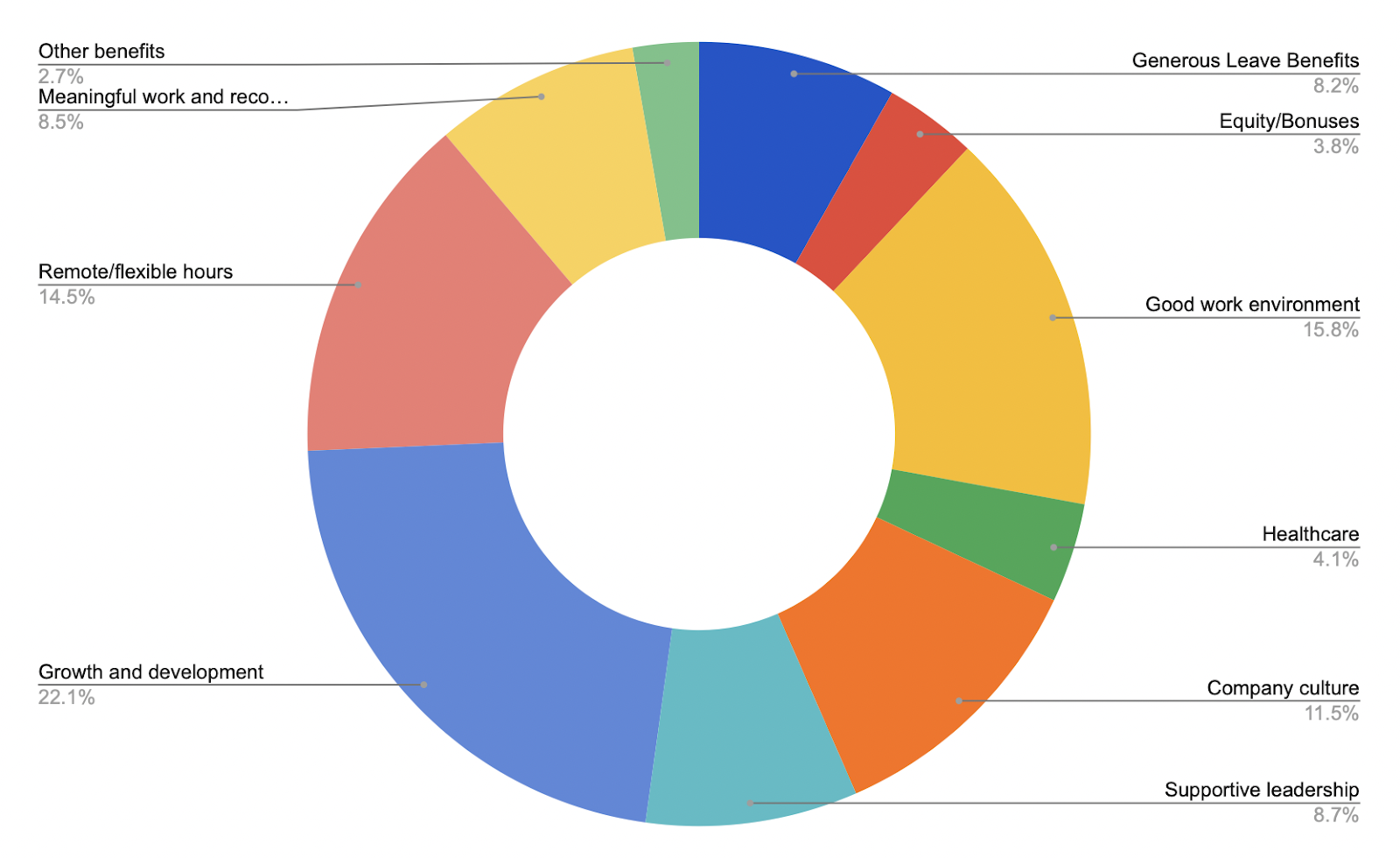Are they happy? Productive? Eager to grow?
Or do you have a nagging feeling all of your remote teams are about to jump ship?
The past couple of years have changed how we approach life and work. We saw thousands of workers quit during the Great Resignation, and it’s not slowing down anytime soon.
If you’re struggling to keep retention rates high, this post is for you. Here’s how to retain top talent in your team, according to actual remote employees:
How to retain remote employees?
We ran a small social survey to see what factors would make people stay in a company for more than 3 years, if money wasn't an issue. The results were pretty telling: elaborate gimmicks weren't the key to retaining top talent.

Instead, we saw 22.1% of respondents saying they’d stay in a company that provided room for growth and development.
Working in a good environment came in second at 15.8%, followed by flexible hours, company culture, and supportive leadership.
Respondents also mentioned factors like:
- Doing meaningful work
- Generous leave benefits
- A comprehensive healthcare plan
- Equity, annual raises, and other bonuses
- miscellaneous benefits like travel, parental leaves, and childcare
Let’s break them down one by one, starting with:
Investing in growth and development
Humans are hardwired to seek constant improvement. In the work setting, this means honing a skill, building subject matter expertise, or moving up the ladder.
Remote workers who proactively seek growth are great assets. They're more productive, motivated, and are eager to build the business.
So what happens when they’re stuck doing the same thing for years?
What happens when they feel stagnant?
Chances are they’d seek growth somewhere else.
Before that happens, create opportunities for continuous growth. It can be as simple as encouraging them to come up with new solutions or earmarking a budget for professional development. A little goes a long way.
“I'd stay in a company that's genuine about being employee-centric,” shares Rox, a graphic designer.
“In my current company, if there was a symposium that you wanted to join or if you wanted to get a certification, they'll pay for everything. Small gestures mean a lot.”
Based on the responses we’ve gathered, you can also:
- Invest in paid courses, training, and certifications for your team. This equips your remote employees with new skills that can help them (and the business) improve.
- Be a mentor. Take someone under your wing and teach them the ropes. Having mentees is a great opportunity to train your company’s future leaders.
- Encourage team members to share their knowledge and skills! Lean into their natural talent. Assign tasks that’ll help them develop their chops.
- Include stipends that your remote team can use to sign up for courses, buy books, or join a paid mastermind community.
- Map out a clear career path. Talk about their career aspirations. How can they grow in your company? Will you provide them with opportunities to achieve their career goals?
Creating a healthy and collaborative work environment

Another factor that can encourage remote team members to stay is a healthy work environment.
Your company’s overall vibe has a huge impact on team morale and productivity. Toxic workplaces often have low engagement, high stress levels, rampant gossip, absenteeism, missed deadlines, and high turnover rates.
People will leave toxic workplaces like these, regardless of the paycheck.
“I realized that the job wasn't worth it when I started dreaded waking up and dragging myself to work. I looked for TONS of excuses to miss work. I always dreamt of having a high salary for as long as I can remember but now as an adult, mental health should be prioritized above everything else,” shares Rebekah, a Filipino preschool teacher based in Singapore.
A healthy and happy work environment, on the other hand, is a place that brings out the best in your team. People are more likely to stay in a company where:
- Roles are clearly defined
- Boundaries are respected
- Communication is open and clear
- The team genuinely loves collaborating with each other
Studies support that happy employees are 13% more productive. If you want to keep employees happy, a healthy work environment is key.
Here’s what you can do to foster that:
- Set realistic tasks for your Filipino virtual assistants. Be careful about delegating too many tasks, assigning stuff beyond their scope, or demanding unreasonably tight deadlines.
- Give them the tools and support they need to do a good job. Onboard them properly and provide training. Offering mental health support can also significantly boost remote employee engagement and retention.
- Build healthy work relationships through team engagement.
- Hire remote employees that match your work culture and get along well with others.
Consider flexible working hours
A recent study from McKinsey showed that flexible working hours is one of the top three factors people look for when considering a new job. With more companies offering flexible work hours, adopting this into your own business could bring in tons of benefits.
Having flexible work arrangements means allowing your team to set their own working hours.
Instead of measuring productivity by the number of hours they clock in, your team focuses on delivering top-notch work within deadlines. Working without the stress of constant surveillance and micromanagement can encourage productivity and help your employees achieve a more balanced lifestyle, too.
The caveat?
You’d need a robust delegation system to pull this off.
Here’s what you can do:
- Hire people you can trust. Here at Somewhere, each candidate goes through a rigorous screening process. We do background checks, behavioral assessments, plus extensive interviews to make sure that each candidate is reliable and trustworthy.
- Document all your processes for a more efficient delegation process. Learn how to make your first SOP through our free course, The Delegation Leap.
- Maximize communication and project management tools to oversee tasks. Slack, Airtable, and Asana are great tools to help you get things done, even when you don’t meet with your team regularly.
- Re-evaluate team meetings. Do you really need to spend hours each week on Zoom video calls?
Related: How to track remote team productivity
Great company culture

Company culture goes beyond team building activities like free pizza nights and foosball tables. It's about having a strong set of core values, and living up to them.
“Working in corporate for more than a decade, I've realized that people eventually will stop working for the money and will start hanging on to what's making them come to work everyday,” shares Pammy, Somewhere’s Head of People and Culture.
What are your company's core values? Do you show it in the way you do business and how you treat your remote workers? More than being a “fun place to work”, do you provide the right benefits and support to your team?
Building a strong company culture in a remote setting has its unique challenges, but it can be done.
Here’s what you can do:
- Define your company’s goals, values, and mission right from the start.
- Keep your team engaged. A simple greeting on Slack or a designated watercooler channel can make all the difference.
- Have solid processes in place.
- Cut back on red tape and bureaucracy as much as you can.
- Bring your distributed team together through virtual lunches, fun Friday activities, or even an annual meetup! You can also take your remote teams to a virtual escape room. It's a great way to keep your remote employees connected and help them to get to know each other.
Supportive and transparent leadership
Bad managers are a liability. A study by GoodHire found out that 82% of workers would quit their jobs because of a bad manager. In a Reddit thread discussing the worst companies to work for in the Philippines, horrible bosses seem to be a common denominator.
If you want to keep your top employees, avoid doing the following:
- Micromanagement
- Abusing your authority
- Demanding people to work beyond the agreed hours
- Making unrealistic promises
- Attacking your subordinates in the guise of “giving constructive feedback”
Another important but often overlooked thing: hire managers who actually have the people management skills. Often, companies simply promote based on tenure or technical skill, but being a good manager is so much more than that.
Managing remote teams takes empathy, an ability to strike a balance between employee advocacy and hitting business goals, plus mad communication skills to be an effective manager. Hire someone who fits the bill and they’ll be an asset to your organization.
Learn more: How a content agency hired an operations lead for $1,300/month
Doing meaningful work

Doing impactful work can be enough to keep people on the job. According to some of the responses on our survey, folks would stay in a job for more than 3 years if they personally find the work meaningful.
This ties back to company culture. More than making money, employees are motivated by your company’s values and purpose. Hire folks who are genuinely interested in your company’s purpose and you’ll have a dedicated team that’ll stick with you for years to come.
It's also important to let your employees know that they're doing work that matters. Employee recognition is incredibly valuable in a remote work environment. Acknowledge their efforts and give credit where it's due. Make them feel seen and valued by:
- Leaving positive comments on their work
- Celebrating achievements with the rest of the team
- Giving awards
Leave policies that make sense
8.2% of respondents mentioned generous leave benefits as a major factor for staying in a company.
Some respondents mentioned wanting unlimited PTO (without the guilt and stigma that comes with it), while others simply wanted leave policies that gave them enough time to rest. Others were more specific, calling for mental health days, generous parental and maternity leaves, and a paid week off during major holidays like Christmas.
There's no one-size-fits-all solution when it comes to formulating a leave policy for your remote workforce. It will ultimately depend on you, your team, and your business needs. Whatever you come up with, make sure it gives your employees the opportunity to live a balanced life.
Related: The Ultimate Guide to Filipino Holidays
Healthcare
In the wake of the pandemic, workers have highlighted the need for robust health insurance policies. Employers from the US are not required to provide benefits like health care to remote Filipino contractors, but it sure can help you attract and retain top talent.
To learn more about the benefits that you can voluntarily give your remote Filipino employees, check out this guide.
Other factors that encourage employees to stick around
Some respondents talked about other interesting benefits that companies can provide. Here are some of them:
- Equity, bonuses, and annual appraisals - turns out, money does matter. A couple of respondents said that they’d stay in a company that provided equity, performance bonuses, and regular raises.
- Travel incentives - for digital nomads, travel perks can be irresistible.
- Childcare - working parents would appreciate having childcare or daycare services provided by the company. Some respondents also mentioned generous maternity leaves.
Why employee retention is important

Hiring new employees is expensive and time-consuming. By retaining staff, you’re saving your company a lot of money in the long run. Projects will be easier to complete and you won’t have to put tasks on the backburner. Overall, retaining employees helps you be more productive.
Aside from this, retaining top talent also means that you’ll be able to:
Keep company knowledge
Think of the knowledge and skills each employee has acquired through experience. These team members likely know the ins and outs of daily operations or have probably SOPs of their own. Through retention, you'll be able to use their expertise to grow your business.
Build strong long-term relationships
Working with remote employees requires trust — and you sure won’t be able to build that if employees don’t last for more than a couple of months. Keeping your best employees in the team means being able to foster long-lasting relationships built on familiarity and mutual respect.
Delegate more tasks
When you trust your employees, you’ll be able to integrate them better within your company. You can delegate more tasks, loop them in important conversations, or assign bigger responsibilities. Keeping talent within your team means it’s easier to hire leadership roles internally, too.
Keep your retention rates high with Somewhere
Employee retention is not about throwing fancy gimmicks. Often, it just means treating your employees with respect, genuinely caring about their growth, and giving them space to do meaningful work.
Hiring folks that match your company’s values is also a huge factor in building strong teams. Here at Somewhere, we specialize in finding employees that fit your company culture and business needs. Tell us about the roles you’re hiring for today and we’ll find you awesome employees that’ll stick with you for years to come.














